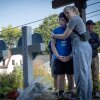Families left Annunciation Catholic School in Minneapolis after a mass shooting on August 27.
Stephen Maturen / Getty Images
hide
tilting legend
Stephen Maturen / Getty Images
This will not happen here. Not at your school. These are the types of reinsurances that parents want to give to their children when something as horrible as a school shooting happens. But here is the problem in the United States: it could happen.
School shots have has increased sharply in recent years, according to data from American Academy of Pediatrics. According to a CNN analysisThere were 44 school shots this year. The Washington Post collected data showing Over 400 School shots from the shooting of the Columbine High School in Colorado in 1999.

And whenever a school shooting occurs, as in Minneapolis on Wednesday, parents and teachers find it difficult to calm the anxieties of children. So what should you say to the children when a shooting occurs?
Start by asking your child what they heard, says David Schonfelda pediatrician who directs the National Center for the School Crisis and Mourning At the Los Angeles children’s hospital.
“Children’s questions can be very different from those of adults,” says Schonfeld. And the best way to determine the information they need is to listen to it.
“Before we can reassure us or help them with what bothers them, we must understand what their real concerns are,” explains Schonfeld. His group has developed Guidelines to talk to children After a tragic event.
Children often ask who is to blame, what could have been done to prevent tragedy or could it happen in my school? The truthful responses are important to establish confidence. And the unfortunate answer is that although school is usually a safe place, there is risks.
“We can help children learn to deal with the distress they feel when they recognize the inherent dangers that are part of the world,” said Schonfeld.
The age of a child will determine the amount of information to be shared, but it is not the only factor. Their emotional reaction can be linked to the amount of trauma they have known in the past or their closely linked to a tragedy. If the victims were their peers, the event will make a stronger emotional assessment than with children who hear about the shooting in the news. In any case, parents will take time to comfort children and help them deal with such tragic events.
“We must be patient, and sometimes, especially young children, need to have these conversations over and over again,” said Melissa BrymerDirector of terrorism and disaster programs at the National Center of UCLA-DUKE University for the traumatic stress of children. “When we do not open the door, we, as adults, we do like a taboo subject,” she said.

The American School Conseil Association has collected a list of Resources and advice to help after a school shoot. At the top is the recommendation of maintaining the routines in place. Even if the children are anxious or frightening, there is an advantage to go to school and maintain daily activities. As the organization explains in its guide, “children derive the safety of routine predictability”.
The organization says that it is also useful to limit the amount of media you and your children take, be it social media, radio, television or reading new online. In a crisis, the main reason to watch, listen or read the media coverage is to understand what is going on. “But if you just look at the same blanket again and again and it does not help you learn something new that is important to you and your family, then you should probably disconnect,” says Schonfeld.
In the days and weeks following a tragedy, parents should speak to their children how to face it when they feel worried or anxious. There are very good books to have these conversations, says Brymer. She recommends Once I was very very frightenedBy Chandra Ghosh IPPEN, for the preschool. In history, many animals go through frightening experiences, but each reacts differently and has their own way of dealing. Brymer says that books like this can help parents and caregivers to help children determine the strategy that suits them best.

For parents of older children, another strategy is to help them convert feelings of anger or anxiety in action. Schonfeld says it is natural to be angry and want to blame someone after a school shooting. But if the children direct their anger against an individual who acted in hatred – like the shooter – that does not remove the sorrow and does not solve the problem. Anger can cause anger.
Another approach is to get involved in initiatives to combat armed violence. For example, students from Marjory Stoneman Douglas secondary school in Parkland, Florida began to put pressure on the control of firearms after the mass shooting in 2018.
“It did not solve the problem, but it made a difference,” explains Schonfeld. Students were effective defenders to draw attention to armed violence.
“So I think yes, children can be part of the solution, but adults must also be a large part of the solution,” he said.

The main thing, says Schonfeld, is to continue to have conversations with your children. “If you talk to children about these types of events, it really prepares you to be able to tell them about other difficult events in your life in the future,” he said.
“And it is more likely that they come to you when there is something that worries him or the upheaval, because they know that you can talk about it.”
There is a lot of uncertainty in these situations. But one thing we know, says Schonfeld: difficult conversations will always be part of life.



